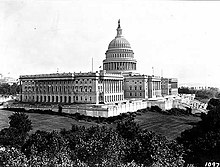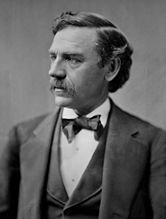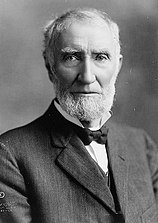61st United States Congress
| 61st United States Congress | |
|---|---|
60th ← → 62nd | |
 United States Capitol (1906) | |
| March 4, 1909 – March 4, 1911 | |
| Senate President | James S. Sherman (R) |
| Senate President pro tem | William P. Frye (R) |
| House Speaker | Joseph G. Cannon (R) |
| Members | 92 senators 391 members of the House 7 non-voting delegates |
| Senate Majority | Republican |
| House Majority | Republican |
| Sessions | |
Special: March 4, 1909 – March 6, 1909 1st: March 15, 1909 – August 5, 1909 2nd: December 6, 1909 – June 25, 1910 3rd: December 5, 1910 – March 3, 1911 | |
The Sixty-first United States Congress was a meeting of the legislative branch of the United States federal government, composed of the United States Senate and the United States House of Representatives. It met in Washington, DC from March 4, 1909, to March 4, 1911, during the first two years of William H. Taft's presidency. The apportionment of seats in the House of Representatives was based on the Twelfth Census of the United States in 1900. Both chambers had a Republican majority.
.mw-parser-output .toclimit-2 .toclevel-1 ul,.mw-parser-output .toclimit-3 .toclevel-2 ul,.mw-parser-output .toclimit-4 .toclevel-3 ul,.mw-parser-output .toclimit-5 .toclevel-4 ul,.mw-parser-output .toclimit-6 .toclevel-5 ul,.mw-parser-output .toclimit-7 .toclevel-6 ul{display:none}
Contents
1 Major events
2 Major legislation
3 Constitutional amendments
4 Party summary
4.1 Senate
4.2 House of Representatives
5 Leadership
5.1 Senate
5.2 House of Representatives
5.2.1 Majority (Republican) leadership
5.2.2 Minority (Democratic) leadership
6 Members
6.1 Senate
6.1.1 Alabama
6.1.2 Arkansas
6.1.3 California
6.1.4 Colorado
6.1.5 Connecticut
6.1.6 Delaware
6.1.7 Florida
6.1.8 Georgia
6.1.9 Idaho
6.1.10 Illinois
6.1.11 Indiana
6.1.12 Iowa
6.1.13 Kansas
6.1.14 Kentucky
6.1.15 Louisiana
6.1.16 Maine
6.1.17 Maryland
6.1.18 Massachusetts
6.1.19 Michigan
6.1.20 Minnesota
6.1.21 Mississippi
6.1.22 Missouri
6.1.23 Montana
6.1.24 Nebraska
6.1.25 Nevada
6.1.26 New Hampshire
6.1.27 New Jersey
6.1.28 New York
6.1.29 North Carolina
6.1.30 North Dakota
6.1.31 Ohio
6.1.32 Oklahoma
6.1.33 Oregon
6.1.34 Pennsylvania
6.1.35 Rhode Island
6.1.36 South Carolina
6.1.37 South Dakota
6.1.38 Tennessee
6.1.39 Texas
6.1.40 Utah
6.1.41 Vermont
6.1.42 Virginia
6.1.43 Washington
6.1.44 West Virginia
6.1.45 Wisconsin
6.1.46 Wyoming
6.2 House of Representatives
6.2.1 Alabama
6.2.2 Arkansas
6.2.3 California
6.2.4 Colorado
6.2.5 Connecticut
6.2.6 Delaware
6.2.7 Florida
6.2.8 Georgia
6.2.9 Idaho
6.2.10 Illinois
6.2.11 Indiana
6.2.12 Iowa
6.2.13 Kansas
6.2.14 Kentucky
6.2.15 Louisiana
6.2.16 Maine
6.2.17 Maryland
6.2.18 Massachusetts
6.2.19 Michigan
6.2.20 Minnesota
6.2.21 Mississippi
6.2.22 Missouri
6.2.23 Montana
6.2.24 Nebraska
6.2.25 Nevada
6.2.26 New Hampshire
6.2.27 New Jersey
6.2.28 New York
6.2.29 North Carolina
6.2.30 North Dakota
6.2.31 Ohio
6.2.32 Oklahoma
6.2.33 Oregon
6.2.34 Pennsylvania
6.2.35 Rhode Island
6.2.36 South Carolina
6.2.37 South Dakota
6.2.38 Tennessee
6.2.39 Texas
6.2.40 Utah
6.2.41 Vermont
6.2.42 Virginia
6.2.43 Washington
6.2.44 West Virginia
6.2.45 Wisconsin
6.2.46 Wyoming
6.2.47 Non-voting members
7 Changes in membership
7.1 Senate
7.2 House of Representatives
8 Committees
8.1 Senate
8.2 House of Representatives
8.3 Joint committees
9 Caucuses
10 Employees
10.1 Senate
10.2 House of Representatives
11 See also
12 References
Major events
- March 4, 1909: William Howard Taft became President of the United States.
Major legislation
- August 5, 1909 – Payne–Aldrich Tariff Act, ch. 6, 36 Stat. 11
- June 18, 1910: Mann–Elkins Act, ch. 309, 36 Stat. 539
- June 25, 1910: Mann Act, ch. 395, 36 Stat. 825
- March 3, 1911: Judicial Code of 1911, ch. 231, 36 Stat. 1087
Constitutional amendments
- July 12, 1909: Approved an amendment to the United States Constitution allowing the Congress to levy an income tax without apportioning it among the states or basing it on the United States Census, and submitted it to the state legislatures for ratification
- Amendment was later ratified on February 3, 1913, becoming the Sixteenth Amendment to the United States Constitution
- Amendment was later ratified on February 3, 1913, becoming the Sixteenth Amendment to the United States Constitution
Party summary
Senate
| Party (shading shows control) | Total | Vacant | ||
|---|---|---|---|---|
Democratic (D) | Republican (R) | |||
| End of the previous congress | 31 | 61 | 92 | 0 |
| Begin | 32 | 59 | 91 | 1 |
| End | ||||
| Final voting share | 7001352000000000000♠35.2% | 7001648000000000000♠64.8% | ||
| Beginning of the next congress | 40 | 50 | 90 | 2 |
House of Representatives
Republican: 219 (majority)
Democratic: 171- Independent Democratic: 1
TOTAL members: 391
Leadership
@media all and (max-width:720px){.mw-parser-output .tmulti>.thumbinner{width:100%!important;max-width:none!important}.mw-parser-output .tmulti .tsingle{float:none!important;max-width:none!important;width:100%!important;text-align:center}}

Senate President
James S. Sherman (R)

Senate President pro tempore
William P. Frye (R)
Senate
President: James S. Sherman (R)
President pro tempore: William P. Frye (R)
Republican Conference Chairman: Eugene Hale
Democratic Caucus Chair: Hernando Money
Democratic Caucus Secretary: Robert Latham Owen
House of Representatives

House Speaker
Joseph Gurney Cannon (R)
Speaker: Joseph Gurney Cannon (R)
Majority (Republican) leadership
Majority Leader: Sereno E. Payne
Majority Whip: John W. Dwight
Republican Conference Chair: Frank Dunklee Currier
Minority (Democratic) leadership
Minority Leader: Champ Clark
Minority Whip: vacant
Democratic Caucus Chairman: Henry De Lamar Clayton, Jr.
Democratic Campaign Committee Chairman: James Tilghman Lloyd
Members
- Skip to House of Representatives, below
Senate
At this time, most Senators were elected by the state legislatures every two years, with one-third beginning new six-year terms with each Congress. A few senators were elected directly by the residents of the state. Preceding the names in the list below are Senate class numbers, which indicate the cycle of their election, In this Congress, Class 1 meant their term ended with this Congress, requiring reelection in 1910; Class 2 meant their term began in the last Congress, requiring reelection in 1912; and Class 3 meant their term began in this Congress, requiring reelection in 1914.
|
|
House of Representatives
|
| 
| ||||||||
Changes in membership
The count below reflects changes from the beginning of the first session of this Congress.
Senate
- replacements: 13
Democratic: 1 seat net gain
Republican: 1 seat net loss
- deaths: 8
- resignations: 2
- vacancy: 1
Total seats with changes: 14
| State (class) | Vacator | Reason for vacancy | Subsequent | Date of successor's installation |
|---|---|---|---|---|
Illinois (3) | Vacant | Sen. was elected at beginning of term. Served in House until resigning June 18, 1909 | William Lorimer (R) | June 18, 1909 |
Pennsylvania (1) | Philander C. Knox (R) | Resigned March 4, 1909, after being appointed United States Secretary of State. Successor was elected. | George T. Oliver (R) | March 17, 1909 |
North Dakota (3) | Martin N. Johnson (R) | Died October 21, 1909. Successor was appointed. | Fountain L. Thompson (D) | October 10, 1909 |
Mississippi (2) | Anselm J. McLaurin (D) | Died December 22, 1909. Successor was appointed. | James Gordon (D) | December 27, 1909 |
North Dakota (3) | Fountain L. Thompson (D) | Resigned January 31, 1910. Successor was appointed. | William E. Purcell (D) | February 1, 1910 |
Mississippi (2) | James Gordon (D) | Successor was elected. | LeRoy Percy (D) | February 23, 1910 |
Louisiana (3) | Samuel D. McEnery (D) | Died June 28, 1910. Successor was appointed and subsequently elected. | John Thornton (D) | December 10, 1910 |
Virginia (1) | John W. Daniel (D) | Died June 29, 1910. Successor was appointed. | Claude A. Swanson (D) | August 1, 1910 |
Iowa (2) | Jonathan P. Dolliver (R) | Died October 15, 1910 | Lafayette Young (R) | November 12, 1910 |
Georgia (3) | Alexander S. Clay (D) | Died November 13, 1910. Successor was appointed. | Joseph M. Terrell (D) | November 17, 1910 |
West Virginia (2) | Stephen B. Elkins (R) | Died January 4, 1911. Successor was appointed. | Davis Elkins (R) | January 9, 1911 |
Colorado (3) | Charles J. Hughes Jr. (D) | Died January 11, 1911. | Vacant until next Congress | |
West Virginia (2) | Davis Elkins (R) | Successor was elected. | Clarence W. Watson (D) | February 1, 1911 |
North Dakota (3) | William E. Purcell (D) | Successor was elected. | Asle Gronna (R) | February 2, 1911 |
House of Representatives
- replacements: 12
Democratic: 3 seat gain
Republican: 3 seat loss
- deaths: 12
- resignations: 6
- contested elections: 0
Total seats with changes: 21
| District | Vacator | Reason for Vacancy | Successor | |
|---|---|---|---|---|
Louisiana 2nd | Vacant | Rep. Robert C. Davey died during previous congress | Samuel L. Gilmore (D) | March 30, 1909 |
Ohio 21st | Vacant | Rep. Theodore E. Burton resigned during previous congress | James H. Cassidy (R) | April 20, 1909 |
Illinois 6th | William Lorimer (R) | Resigned June 17, 1909, after being elected to the U.S. Senate | William Moxley (R) | November 23, 1909 |
Washington 2nd | Francis W. Cushman (R) | Died July 6, 1909 | William W. McCredie (R) | November 2, 1909 |
Virginia 4th | Francis R. Lassiter (D) | Died October 31, 1909 | Robert Turnbull (D) | March 8, 1910 |
Philippines Resident Commissioner | Pablo Ocampo | Term ended November 22, 1909 | Manuel L. Quezon (Unionist) | November 23, 1909 |
Missouri 6th | David A. De Armond (D) | Died November 23, 1909 | Clement C. Dickinson (D) | February 1, 1910 |
Georgia 2nd | James M. Griggs (D) | Died January 5, 1910 | Seaborn Roddenbery (D) | February 6, 1910 |
Massachusetts 14th | William C. Lovering (R) | Died March 11, 1910 | Eugene Foss (D) | January 4, 1911 |
New York 32nd | James B. Perkins (R) | Died February 4, 1910 | James S. Havens (D) | April 19, 1910 |
Texas 3rd | Gordon J. Russell (D) | Resigned June 14, 1910, after being appointed judge for the United States District Court for the Eastern District of Texas | Robert M. Lively (D) | July 23, 1910 |
Tennessee 1st | Walter P. Brownlow (R) | Died July 8, 1910 | Zachary D. Massey (R) | November 8, 1910 |
Louisiana 2nd | Samuel L. Gilmore (D) | Died July 18, 1910 | H. Garland Dupré (D) | November 8, 1910 |
Massachusetts 4th | Charles Q. Tirrell (R) | Died July 31, 1910 | John J. Mitchell (D) | November 8, 1910 |
Pennsylvania 5th | William W. Foulkrod (R) | Died November 13, 1910 | Seat remained vacant until next Congress | |
Pennsylvania 2nd | Joel Cook (R) | Died December 15, 1910 | Seat remained vacant until next Congress | |
Massachusetts 14th | Eugene Foss (D) | Resigned January 4, 1911, after being elected Governor of Massachusetts | Seat remained vacant until next Congress | |
Pennsylvania 24th | John K. Tener (R) | Resigned January 16, 1911, after being elected Governor of Pennsylvania | Seat remained vacant until next Congress | |
Pennsylvania 19th | John M. Reynolds (R) | Resigned January 17, 1911, after being elected Lieutenant Governor of Pennsylvania | Seat remained vacant until next Congress | |
North Dakota 2nd | Asle Gronna (R) | Resigned February 11, 1911, after being elected to the U.S. Senate | Seat remained vacant until next Congress | |
Maine 1st | Amos L. Allen (R) | Died February 20, 1911 | Seat remained vacant until next Congress | |
Committees
Lists of committees and their party leaders, for members (House and Senate) of the committees and their assignments, go into the Official Congressional Directory at the bottom of the article and click on the link (4 links), in the directory after the pages of terms of service, you will see the committees of the Senate, House (Standing with Subcommittees, Select and Special) and Joint and after the committee pages, you will see the House/Senate committee assignments in the directory, on the committees section of the House and Senate in the Official Congressional Directory, the committee's members on the first row on the left side shows the chairman of the committee and on the right side shows the ranking member of the committee.
Senate
Additional Accommodations for the Library of Congress (Select)- Agriculture and Forestry
- Appropriations
- Audit and Control the Contingent Expenses of the Senate
- Canadian Relations
- Census
- Civil Service and Retrenchment
- Claims
- Coast and Insular Survey
- Coast Defenses
- Commerce
- Conservation of National Resources
- Corporations Organized in the District of Columbia
- Cuban Relations
- Disposition of Useless Papers in the Executive Departments
Distributing Public Revenue Among the States (Select)- District of Columbia
- Education and Labor
- Engrossed Bills
- Enrolled Bills
Establish a University in the United States (Select)
Examination of Disposition of Documents (Select)- Examine the Several Branches in the Civil Service
- Expenditures in the Department of Agriculture
- Expenditures in the Interior Department
Expenditures in the Department of Justice (Select)
Expenditures in the Navy Department (Select)- Expenditures in the Post Office Department
Expenditures in the Department of State (Select)
Expenditures in the Treasury Department (Select)
Expenditures in the War Department (Select)- Finance
- Fisheries
Five Civilized Tribes of Indians (Select)- Foreign Relations
- Forest Reservations and the Protection of Game
- Geological Survey
- Immigration
- Immigration and Naturalization
- Indian Affairs
Indian Contracts Investigation (Select)- Industrial Expositions
- Interoceanic Canals
- Interstate Commerce
- Irrigation and Reclamation
- Judiciary
- Library
- Manufactures
- Military Affairs
- Mines and Mining
Mississippi River and its Tributaries (Select)- National Banks
- Naval Affairs
- Pacific Islands and Puerto Rico
- Pacific Railroads
- Patents
- Pensions
- Philippines
- Post Office and Post Roads
Potomac River Front (Select)- Printing
- Private Land Claims
- Privileges and Elections
- Public Buildings and Grounds
- Public Expenditures
- Public Health and National Quarantine
- Public Lands
- Railroads
- Revision of the Laws
- Revolutionary Claims
- Rules
Standards, Weights and Measures (Select)
Tariff Regulation (Select)- Territories
- Third Degree Ordeal
Transportation and Sale of Meat Products (Select)- Transportation Routes to the Seaboard
Trespassers upon Indian Lands (Select)
Wages and Prices of Commodities (Select)- Whole
- Woman Suffrage
House of Representatives
- Accounts
- Agriculture
- Alcoholic Liquor Traffic
- Appropriations
- Banking and Currency
- Census
- Claims
- Coinage, Weights and Measures
- Disposition of Executive Papers
- District of Columbia
- Education
- Election of the President, Vice President and Representatives in Congress
- Elections
- Enrolled Bills
- Expenditures in the Agriculture Department
- Expenditures in the Commerce and Labor Departments
- Expenditures in the Interior Department
- Expenditures in the Justice Department
- Expenditures in the Navy Department
- Expenditures in the Post Office Department
- Expenditures in the State Department
- Expenditures in the Treasury Department
- Expenditures in the War Department
- Expenditures on Public Buildings
- Foreign Affairs
- Immigration and Naturalization
- Indian Affairs
- Industrial Arts and Expositions
- Insular Affairs
- Interstate and Foreign Commerce
- Invalid Pensions
- Irrigation of Arid Lands
- Labor
- Levees and Improvements of the Mississippi River
- Manufactures
- Merchant Marine and Fisheries
- Mileage
- Military Affairs
- Militia
- Mines and Mining
- Naval Affairs
- Pacific Railroads
- Patents
- Pensions
- Post Office and Post Roads
- Public Buildings and Grounds
- Public Lands
- Railways and Canals
- Reform in the Civil Service
- Revision of Laws
- Rivers and Harbors
- Rules
- Standards of Official Conduct
- Territories
- Ventilation and Acoustics
- War Claims
- Ways and Means
- Whole
Joint committees
Conditions of Indian Tribes (Special)- Disposition of (Useless) Executive Papers
- Investigate the Interior Department and Forestry Service
Caucuses
Democratic (House)
Democratic (Senate)
Employees
Architect of the Capitol: Elliott Woods
Librarian of Congress: Herbert Putnam
Public Printer of the United States: Samuel B. Donnelly
Senate
Chaplain:
Edward E. Hale (Unitarian) until June 10, 1909
Ulysses G.B. Pierce (Unitarian) elected June 18, 1909
Secretary: Charles G. Bennett
Sergeant at Arms: Daniel M. Ransdell
House of Representatives
Chaplain: Henry N. Couden (Universalist)
Clerk: Alexander McDowell
Doorkeeper: Frank B. Lyon
Clerk at the Speaker’s Table: Asher C. Hinds
Postmaster: Samuel Langum
Reading Clerks: N/A (D) and N/A (R)
Sergeant at Arms: Henry Casson
See also
United States elections, 1908 (elections leading to this Congress)
- United States presidential election, 1908
- United States Senate elections, 1908
- United States House of Representatives elections, 1908
United States elections, 1910 (elections during this Congress, leading to the next Congress)
- United States Senate elections, 1910
- United States House of Representatives elections, 1910
References
Gould, Lewis L. (2005). The Most Exclusive Club. Cambridge, MA: Perseus Books Group. ISBN 0-465-02778-4..mw-parser-output cite.citation{font-style:inherit}.mw-parser-output .citation q{quotes:"""""""'""'"}.mw-parser-output .citation .cs1-lock-free a{background:url("//upload.wikimedia.org/wikipedia/commons/thumb/6/65/Lock-green.svg/9px-Lock-green.svg.png")no-repeat;background-position:right .1em center}.mw-parser-output .citation .cs1-lock-limited a,.mw-parser-output .citation .cs1-lock-registration a{background:url("//upload.wikimedia.org/wikipedia/commons/thumb/d/d6/Lock-gray-alt-2.svg/9px-Lock-gray-alt-2.svg.png")no-repeat;background-position:right .1em center}.mw-parser-output .citation .cs1-lock-subscription a{background:url("//upload.wikimedia.org/wikipedia/commons/thumb/a/aa/Lock-red-alt-2.svg/9px-Lock-red-alt-2.svg.png")no-repeat;background-position:right .1em center}.mw-parser-output .cs1-subscription,.mw-parser-output .cs1-registration{color:#555}.mw-parser-output .cs1-subscription span,.mw-parser-output .cs1-registration span{border-bottom:1px dotted;cursor:help}.mw-parser-output .cs1-ws-icon a{background:url("//upload.wikimedia.org/wikipedia/commons/thumb/4/4c/Wikisource-logo.svg/12px-Wikisource-logo.svg.png")no-repeat;background-position:right .1em center}.mw-parser-output code.cs1-code{color:inherit;background:inherit;border:inherit;padding:inherit}.mw-parser-output .cs1-hidden-error{display:none;font-size:100%}.mw-parser-output .cs1-visible-error{font-size:100%}.mw-parser-output .cs1-maint{display:none;color:#33aa33;margin-left:0.3em}.mw-parser-output .cs1-subscription,.mw-parser-output .cs1-registration,.mw-parser-output .cs1-format{font-size:95%}.mw-parser-output .cs1-kern-left,.mw-parser-output .cs1-kern-wl-left{padding-left:0.2em}.mw-parser-output .cs1-kern-right,.mw-parser-output .cs1-kern-wl-right{padding-right:0.2em}
Remini, Robert V. (2006). The House. New York: HarperCollins Publishers, Inc. ISBN 0-06-088434-7.
U.S. Congress (2005). "Biographical Directory of the U.S. Congress". Archived from the original on June 1, 2006. Retrieved June 1, 2006.
U.S. House of Representatives (2006). "Congressional History". Archived from the original on June 1, 2006. Retrieved June 1, 2006.
U.S. Senate (2006). "Statistics and Lists". Archived from the original on June 1, 2006. Retrieved June 1, 2006.
Official Congressional Directory for the 61st Congress, 1st Session.
Official Congressional Directory for the 61st Congress, 2nd Session.
Official Congressional Directory for the 61st Congress, 2nd Session (Revision).
Official Congressional Directory for the 61st Congress, 3rd Session.
Official Congressional Directory for the 61st Congress, 3rd Session (Revision).